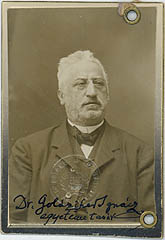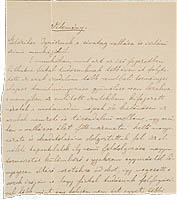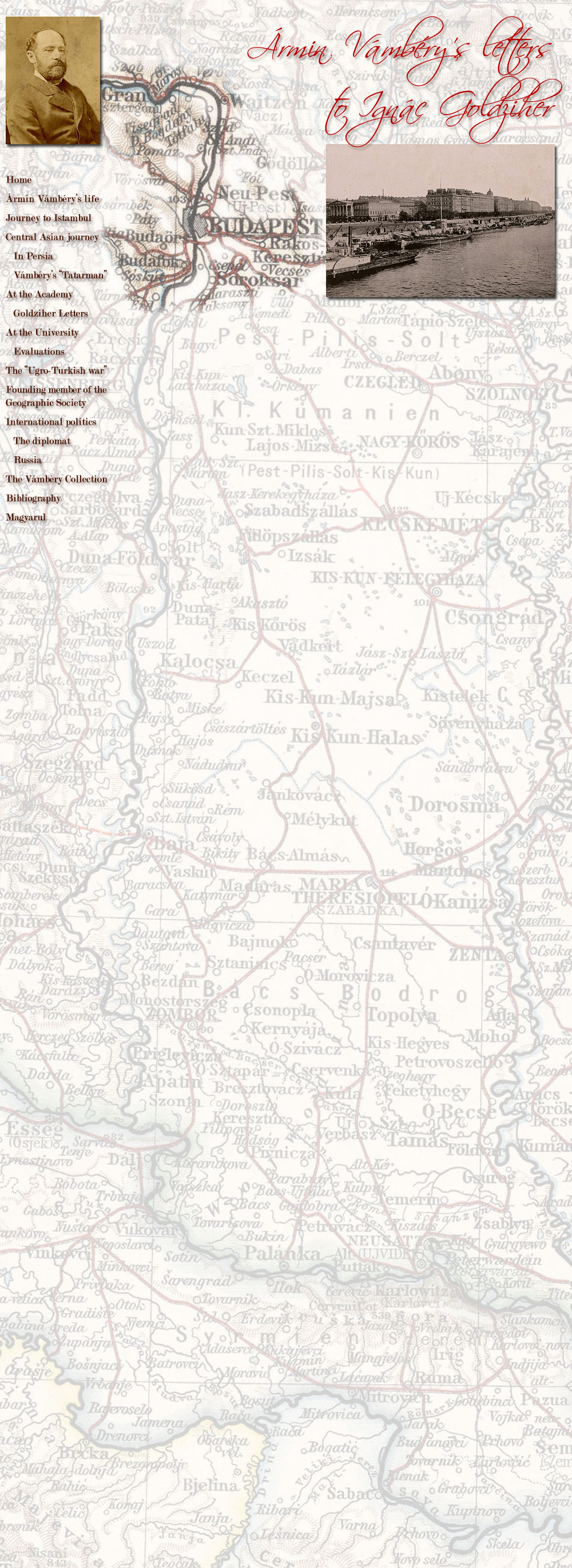 Ármin
Vámbéry stayed in close contact until the end of his life with his first
student, Ignác Goldziher (1850-1921), the still dominant figure of European
Islam research. A good documentation of their relationship are Vámbéry’s letters
and – in lack of Goldziher’s replies – the Diary of Goldziher,
1 as well as his Commemorative speech written on Vámbéry’s
death.
2
Ármin
Vámbéry stayed in close contact until the end of his life with his first
student, Ignác Goldziher (1850-1921), the still dominant figure of European
Islam research. A good documentation of their relationship are Vámbéry’s letters
and – in lack of Goldziher’s replies – the Diary of Goldziher,
1 as well as his Commemorative speech written on Vámbéry’s
death.
2
Their communication was determined by the teacher-student relationship.
Goldziher emphasized both in his Diary and in his Commemorative
speech, how great an impact Vámbéry’s suggestive lectures had on him: “This
vivid immediacy necessarily influenced the spirit of the young student, and
transferred him by magic into that living Oriental milieu, whose spiritual
phenomena he tried to understand.”
3 Vámbéry was understandably proud that the attention of the young
researcher, who became one of the most prestigious Islam scholars of the
contemporary world, was directe by him toward the East. “I would be an evil
spirit if I ever forgot… or deny, that I must thank to Vámbéry my sincere
attraction to the Oriental studies”, writes Goldziher in his Diary (p. 35),
which is beautifully echoed by a late letter of Vámbéry: “when they speak about
the studies of Goldziher, I have to insist that I know him as my first
student, whom I introduced into the hall of Oriental knowledge, whose first
steps were led by me, and for whose advance I had to fight and lobby a lot.”.
4
Goldziher’s correspondence in the Oriental Collection of the Hungarian Academy
of Sciences, organized by his son Károly, contains about 13,000 letters from
more than 1,600 persons, and Vámbéry figures with a decisive amount among them.
Only 56 persons sent more letters to Goldziher than he, and these also include
the dervish with 71 letters. In addition to these letters,
the envelope marked GIL/44/09 also contains two business cards from Mrs. Vámbéry,
and an envelope and a letter from the Turanian Society,
5
Goldziher’s response draft to a letter of Vámbéry, and three obituaries of
Vámbéry.
6
The linguistic and thematic distribution of the letters is very interesting.
Vámbéry was on correspondence with his student since the 1860s, and the language
of these letters was almost exclusively German
7
as long as 1894. 27 letters have survived from this period, and this series was
broken only by two letters in Hungarian and one in English.
8
However, in 1894 this proportion changed on the contrary. While the letters
dated to the early months of the year were written in German, in June Vámbéry
already proposed his “private secretary” to the attention of Goldziher in
Hungarian.
9
From then on – with four exceptions – he only wrote in Hungarian, a total of 37
letters.
Among the letters we also find postcards and business cards, on which Vámbéry
wrote a few words. The tone of the letters is always very friendly. The undated
but certainly first letter is addressed as “Liebes Kind”,
10
the German-language ones “Lieber Natzi”, and the Hungarians “Kedves
öcsém uram” (My dear young lord). Goldziher addresses Vámbéry in his surviving
Hungarian letter as “Nagyon tisztelt professor ur!” (Very honored Mr.
Professor), and in the early German one as “Hochwürdiger
Herr”.
11
The three letters written in the 1910s by Rusztem
Vámbéry to Goldziher were addressed to “Mélyen Tisztelt Goldziher Bácsi” (Deeply
revered Uncle Goldziher),
12
and “Kedves
Goldziher Bácsi” (Dear Uncle Goldziher).
13
An even more detailed picture can be obtained from the thematical distribution
of the letters. In the long letters written in the 1870s Vámbéry provides the
young scholar with advices, or asks him for some favors
14
during his European university studies. Vámbéry also felt the death of József
Eötvös
15
to be a major blow for the Hungarian Oriental studies, and shared this opinion
with Goldziher. In addition, we can find the following topics:
– request for support to someone, either for a recommendation for an
academic membership (Aurél Stein
16
), professional care,
17 or for gaining the financial support of the Jewish Community of
Pest (R. Mordekhai Deutsch,
18 Bernát
Munkácsi, Ignác Kunos
19
), of which
Goldziher was the secretary since 1874;
– congratulations on the occasion of the appointments,
20 family events,
21 or release of books
22 of Goldziher (as well as the expression of compassion
23 for the death of Goldziher’s mother);
– New Year’s
24
and other
25
greetings, invitations;
26
– request and offering of etymologies. This is the actually professional
part of the correspondence, which clearly shows that Goldziher repeatedly turned
to his former master when he could not cope with a Turkish expression,
27
and Vámbéry also counted on Goldziher’s answer in the case of the Arabic
language, which was never learned by him
28
There is only one, highly significant exchange of letters from the spring of
1897, which cannot be inserted in the above categories. To understand it, we
have to note that in 1881 Goldziher broke his connections with Vámbéry,
29
an continued them only twelve years later, when his former professor asked him
30
to send him his list of publications, as this was necesary for Vámbéry’s
proposal for a public ordinary professor at the Faculty of Letters.
31
The subject of the 1897 correspondence is a new proposal of Vámbéry, which was
submitted to the Faculty of Letters to provide regular “rewards” to Goldziher,
who did not yet receive a salary for his university teacher’s job. “My request” –
writes in the official document
32
– “to the respected Faculty of Letters is the following: let the Faculty address
a petition to the Minister of Religion and Education, His Eminence Gyula
Wlassics, in which they propose a reward of yearly 1500 forint to Ignác Goldzieher [sic].
33
The interesting side of this exchange of letters lies in its fullness, since not
only Vámbéry’s formal submission of 27 April 1897 has survived (which, having
withdrawn it from the Faculty, he himself sent over to Goldziher), but also the
detailed response draft of Goldziher written in the night of 1 May,
34
and even the two answers written by Vámbéry on 2 May
35
and 6 May.
36
Goldziher, as he writes in his Diary, saw this proposal for the first
time on the table of the Dean, and he was very upset by it. “This is where I got
in the 26th year of my university career? A supplication instead of a clear
recognition? And in addition, the expectable failure.”
37
However, at that time he still thought to let the things flow on their own way.
But on the same day he also visited Vámbéry, who mentioned him the application,
and as a result, in the night of 1 May he wrote a long letter to his former
professor, asking him to withdraw the submission. Vámbéry, having carefully
considered Goldziher’s words, first decided to present the application to the
Faculty if it will be accepted “without debate and contrary vote”. However, in
his second letter he writes that during his informal interviews he learned that
the debate would be inevitable, thus he withdrew his proposal, but he did not
give up supporting Goldziher’s advance. “I will speak with the minister, and I
hope that he will fulfill my wish by his own will” –, he closes his
letter.
 Vámbéry
supported his former student not only in his university career, but since his
youth he tried to introduce him into the Hungarian scientific world, encouraged
him to publish, and presented his studies at the Academy, which, however, was
later felt unjust by Goldziher, who loved to mature his works.
38
Goldziher felt that after the outbreak of the “Ugro-Turkish
war” many opponents of Vámbéry also transferred their hostility on him, the
“house student” of Vámbéry.
39
Vámbéry willingly wrote opinions even in the later years on Goldziher’s works
waiting for publication, as it is attested by a handwritten page on his study
“The religion of the desert and the Islam”.
40
Vámbéry
supported his former student not only in his university career, but since his
youth he tried to introduce him into the Hungarian scientific world, encouraged
him to publish, and presented his studies at the Academy, which, however, was
later felt unjust by Goldziher, who loved to mature his works.
38
Goldziher felt that after the outbreak of the “Ugro-Turkish
war” many opponents of Vámbéry also transferred their hostility on him, the
“house student” of Vámbéry.
39
Vámbéry willingly wrote opinions even in the later years on Goldziher’s works
waiting for publication, as it is attested by a handwritten page on his study
“The religion of the desert and the Islam”.
40
From the above exchange of letters and the other gestures of Vámbéry in support
of Goldziher – recommendations of books, invitations etc. – it seems that
Goldziher unjustly accused his former professor by doing a negative campaign
against his university advance.
41
The tensions may have come from their extremely different disposition: the
self-taught traveler, who changed faith several times, published with an easy
hand, thereby also opening new fields of research was the contrary of the
well-trained scholar, who deeply felt his religion, and put down every single
line with great consideration and care.
42
However, at the death of Vámbéry
Goldziher was able to overcome his reservations. He devoted a part of the summer
of 1915 to write the Commemorative speach,
43
in which he appreciated for long and in detail the groundbreaking nature of
Vámbéry’s achievements in several fields. He gave a personal and individual
overtone to his commemoration and appreciation by mentioning that in October
1865 “he was the first student, who … enrolled for his lectures”,
44 and with the speech delivered on 25 October “he closed the
“Vámbéry chapter” of his life.
45



















